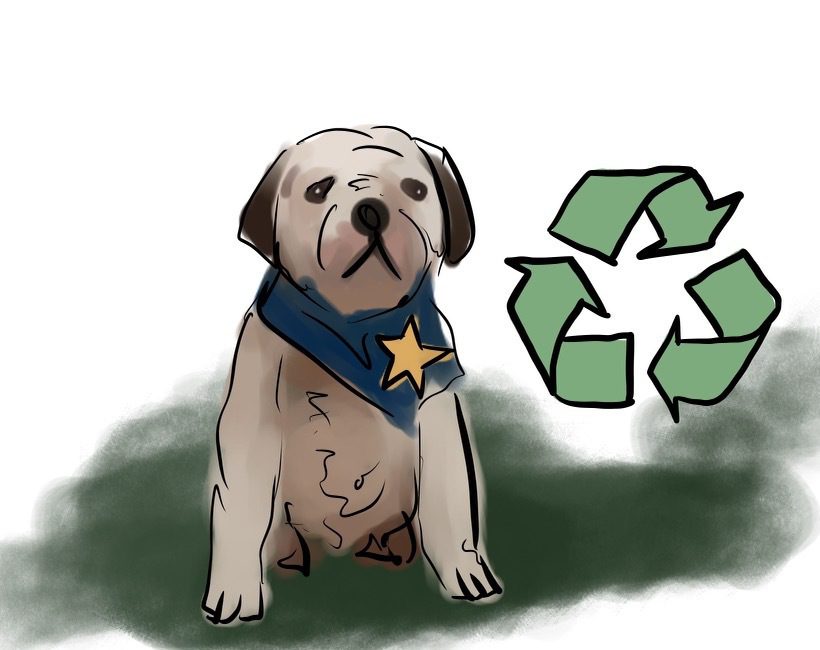Gold rating on recent report shows Yale’s sustainability progress
The University earned its second gold rating from the Association for the Advancement of Sustainability in Higher Education’s STARS rating system.

Clarissa Tan, Staff Illustrator
This fall, Yale received a gold rating from a college sustainability tracking group, scoring higher than in previous years but falling well short of the system’s highest platinum rating.
The high rating, granted by the Association for the Advancement of Sustainability in Higher Education, recognized Yale’s sustainability efforts in several areas while also highlighting the need for improvement in sustainable finance and campus engagement.
Out of a possible 100 points, the University scored 70.5 total points, an increase from its previous score of 67.8, which it achieved in 2020. The scoring rubric is made up of five overarching categories — operations, planning and administration, innovation and leadership, academics and engagement. The gold rating, which requires a minimum of 65 points, is the second highest score on the scale. Platinum, the highest rating, requires a total score of 85 points.
Yale could increase its score for future years by upping engagement with students in the professional and graduate schools, according to Lisa Noriega, a data analyst at the University’s Office of Sustainability.
“The [STARS] report itself reflects areas needing attention as we develop our office’s programming,” Noriega said. “As a result of this reflection, new programming is underway to target a broader student population more effectively.”
By submitting data to STARS, according to Noriega, the University is also automatically submitting data to college sustainability rankings, including the Princeton Review’s Guide to Green Colleges and the Sierra Club’s Cool School Ranking.
Princeton University also received a gold rating this year, while Stanford University scored at the platinum level. Several other peer institutions have not yet received ratings.
The rankings are another way to highlight the University’s sustainability efforts. According to the AASHE STARS website, universities derive several benefits from self-reporting for STARS ratings, including connections with other STARS institutions, suggestions for community engagement and concrete metrics to drive future sustainability efforts.
Sebastian Duque ’24, co-president of the Yale Student Environmental Coalition, cautioned against putting too much credit on the results of the report and others like it, noting that reports like STARS are not always effective at measuring campus sustainability and that the University is more open to making changes to its sustainability plan when pressured by student activism.
“In general, institutions can very easily use ratings like these to greenwash themselves and promote themselves as sustainable spaces or sustainable institutions when they’re not really fulfilling the full share that they could be,” Duque said.
Even though Yale’s overall performance received a gold rating, the University did not perform well in all categories. It received its lowest scores in the subcategories of “investment and finance” and “wellbeing and work.”
The University received a 0.83 out of 5 possible points for “sustainable investment” and 0 of 1 possible points for “investment disclosure.” According to AASHE, schools are scored on the accessibility of information related to investments, the presence of an effective sustainable investments policy and engagement with divestment efforts.
“I think Yale is a sustainability leader in a lot of ways, in their operations and buildings, thought leadership and research,” said Jamie Chan ’23, a former president of YSEC. “There are still definitely substantial ways that they can improve, particularly with sharing Yale’s sustainability resources with New Haven and taking serious calls for fossil fuel divestment.”
Student groups like the Yale Endowment Justice Coalition have pressured the University to divest from fossil fuels, a commitment Yale has so far refused to make.
The current Yale Sustainability Plan outlines the University’s goal for divestment to “encourage Yale’s external investment managers to consider the risks and opportunities associated with climate change in their investment processes with respect to Yale’s portfolio.”
The University’s sustainability plan was not created to align with the STARS rating system, according to Noriega. Yale’s sustainability plan was created years before the STARS assessment system, but in creating the next sustainability plan for 2025, however, the results of the STARS report can help shape more of the University’s goals for sustainability efforts in the future.
AASHE was established in 2005.







